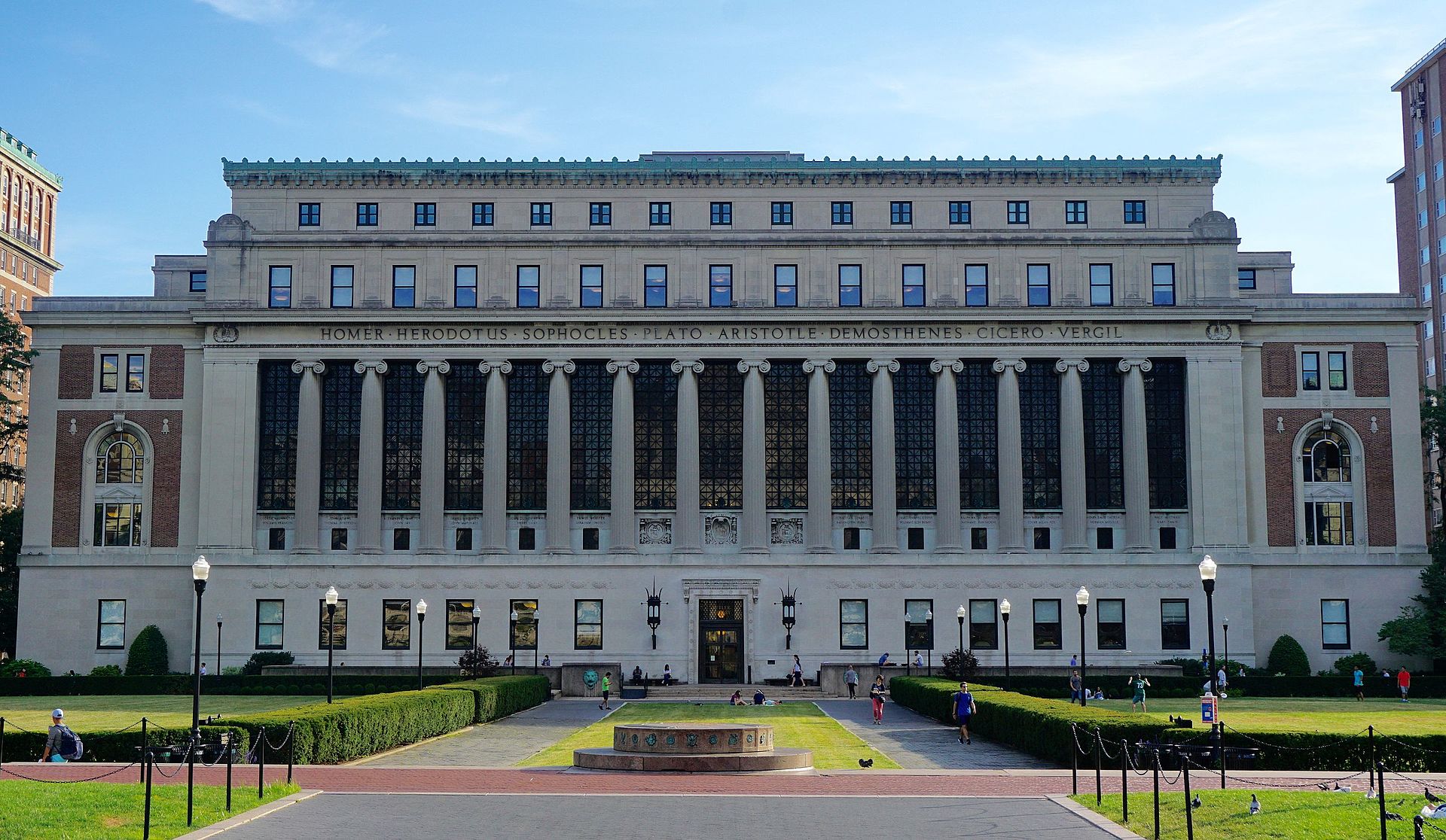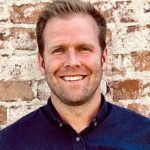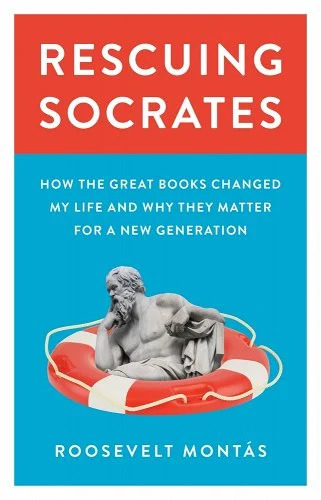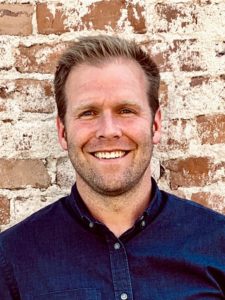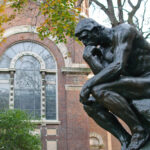Caldwell, ID. In 1513, after serving for years in the courts of Florence, Niccolò Machiavelli found himself on the losing side of a Medici plot and was exiled from his beloved city. He was likely tortured before he left. In his new life, he farmed on his family estate and spent his days debating peasants in the local inn. But that was not all. He described the rest of his day in a remarkable and justly famous letter to his friend Francesco Vettori:
When evening comes, I return to my home, and I go into my study; and on the threshold, I take off my everyday clothes, which are covered with mud and mire, and I put on regal and curial robes; and dressed in a more appropriate manner I enter into the ancient courts of ancient men and am welcomed by them kindly, and there I taste the food that alone is mine, and for which I was born; and there I am not ashamed to speak to them, to ask them the reasons for their actions; and they, in their humanity, answer me; and for four hours I feel no boredom, I dismiss every affliction, I no longer feel poverty nor do I tremble at the thought of death: I become completely part of them.
Roosevelt Montás, the author of Rescuing Socrates, was likewise welcomed kindly into these ancient courts after finding a whole set of Harvard Classics in the garbage and—due to limited space for books in the Queens apartment of his teen years—saving the Plato volume from suffering the fate of the rest of the series. Like Machiavelli, he is also unashamed to speak with the ancient men and to question them. His new book is a generous and magnanimous account of his own initiation into the world of classics via the Columbia College Core Curriculum, as well as a thoughtful record of his continued engagement with them in many classrooms at Columbia and elsewhere.
Rescuing Socrates has sparked much debate since its publication, including in our own sharp review by Eric Adler. Continuing the discussion here is Jessica Hooten Wilson, Louise Cowan Scholar in Residence at the University of Dallas; Christine Norvell, dean of the upper school at Sager Academy; and Doug Sikkema, professor of Core Studies and English at Redeemer University (and my fellow associate editor at FPR).
Stewart: Montás makes it a practice in his classes to ask, “In what way is this author right?” In that generous spirit, what insight from Rescuing Socrates did you find most compelling and valuable?
Wilson: I enjoyed hearing about how Roosevelt’s teachers made an impression on him. Sometimes we focus on liberal arts as only content, but “arts” connote a master and apprentice learning a shared craft. “If the Core is not taught well, the Core is not taught,” Montás quotes his associate director of Columbia’s Core Curriculum, Janine de Novais, adding, “For good and ill, liberal education is a personality-driven enterprise.” Perhaps one of the reasons that the liberal arts are losing their persuasion in the mass market is because no one liked their humanities teachers? That’s on us, those of us who teach. Even Augustine makes that point in the context of sermons: preachers must learn to preach well, to engage the listeners with delight as well as instruction in order to be persuasive. So, too, teachers should prioritize the relationship with students for the tradition to come alive in them.
Norvell: When Montás describes his summer work with high schoolers, I most enjoyed the idea of a liberal arts education as a great leveler, a journey that doesn’t limit or polarize students based on current cultural norms. Like Montás, I hope the Great Books remain great because their purpose is not exclusive but inclusive, building historical awareness and a shared vocabulary that equips students to see beyond politicization. I borrow from a friend who calls the Great Books “mirrors, telescopes, and microscopes.” Yes, these texts are “weighted toward the past” and questions about “Western texts” will always abound, but Montás balances concerns with ease. He welcomes curriculum questions as a reflective endeavor with his college students, revisiting potential curriculum changes every three years.
Sikkema: Part of this book’s undoubtable charm is the spirit in which—or perhaps by whom—it is written. Roosevelt Montás is, in many ways, the ideal advocate for a living tradition. He has a deep, unapologetic reverence for the past coupled with a winsome delight in remaining hospitable to new voices. His defense of tradition never veers, as you rightly note, to defensiveness, a commonplace that makes so many other books in this particular genre somewhat grating after a while. One gets the clear sense from Montás that these voices from the past are not just texts with trivial information, but real presences, real friends who have had a significant role in shaping, forming Montás’ life. And if any core program is going to work, it needs men and women like Montás who are the living, breathing embodiment of a life made richer by true fellowship with this great “democracy of the dead,” to borrow Chesterton’s phrase.
Stewart: Montás argues that there is still a place for the liberal arts college ideal that introduces students to their education with pre-disciplinary books oriented towards big existential and ethical questions. Core courses, in other words, should not just be framed as an introduction to the various disciplines that make up the research university. He uses Andrew Delbanco’s concise distinction between the two to make this point: “[The college] is about transmitting knowledge of and from the past to undergraduate students so they may draw upon it as a living resource in the future. [The university] is mainly an array of research activities conducted by faculty and graduate students with the aim of creating new knowledge in order to supersede the past” (126). Without dismissing the value of the research university, Montás argues that its dominance at the expense of the college ideal is truly a loss. He ultimately makes a case for a peaceful co-existence. Can the college and university co-exist, or is it more of a zero-sum game?
Wilson: Colleges will coexist with universities if they do not try to do the job of the other. The prevailing dominance of the modern research university has prioritized specialization over generalists, despite how much we have seen generalists triumph over specialists (Just see Range by David Epstein). If you read The Evidence the Liberal Arts Need, you’ll see the history in which college was meant to capstone what began K-12; there was a continuum that has been lost. To change the colleges and universities, we have to imagine life-long learning from birth to death and learn how to see an education narrative that is consistent.
Norvell: I do fear the “business” identity of colleges has overrun the ideal of the college. Small private liberal arts schools do thrive, but even in established colleges, programs falter because too few students declare majors in languages, classics, or fine arts. As a German major at a Christian liberal arts school, our middle son discovered his major was dissolving as he entered his senior year this past fall. Programs were cut, professors let go, all because few students chose these programs over the newest business majors. I do see this particular circumstance as a symptom of the root Montás addresses. In education, where do we place our value? How do students know what they don’t know, what they might be missing? Liberal arts colleges and programs have not died out. Not at all. But I do worry that fewer and fewer schools fund and fight for liberal learning. That’s why I appreciate Montás’s final thoughts about embedding a liberal arts core in every undergraduate degree. Foundational courses, not majors, can be true foundations.
Sikkema: My career at this point is perhaps banking on the fact that not only can these co-exist, but they must. To be clear, in the larger research universities that I know about or have been a part of, I’m not naïve that the currents countering such a vision of college are very difficult to swim against. Universities committed to research have all but gutted any notion of bildung or paideia from their self-understood missions. More, students who have bought into the utilitarian ethos permeating higher education understand themselves to be consumers of an educational product that will land them in the top tier of wages, status, and power. And the data show they are not wrong for thinking this. So the cultural momentum, if you will, is a centrifugal movement pushing students away from these “useless” courses.
However, I don’t think it has to be a zero-sum game at all. But before any institution asks the question about “how” the college and university might co-exist, they need to be convinced of the “why.” And then this requires difficult conversations about building programs that might, in some contexts, be “loss leaders” from a financial perspective. Such programs might require funding from other aspects of the university or depend upon targeted development campaigns that require time, attention, and willpower from the entire bureaucratic apparatus of the university. I understand that even having such conversations is a kind of luxury smaller universities may not feel they can entertain. All I would say is that the vision must guide the budget, and not vice versa.
Stewart: The Columbia Core Curriculum that Montás has inherited is liberal arts education that “lives in the questions, not in the answers.” He writes further: “Except for the premise—which is itself contestable—that the best life for a human being must include conscious reflection on the nature of human good, a liberal education does not specify the content of that good” (192-193). Can this ideal be realized at Christian institutions that do consciously try to pass on to students a distinct vision of what is true, good, and beautiful?
Wilson: In Three Rival Versions of Moral Enquiry, Alasdair MacIntyre defines “the university as a place of constrained disagreement, of imposed participation in conflict, in which a central responsibility of higher education would be to initiate students into conflict.” Christian universities should not be trying to pass on one perspective or they are not being Christian universities. Montás describes the task of liberal education as “not to deliver truths, but to cultivate the life-altering disposition to look inward even as one looks outward.” Through great books, we can become those who know ourselves better and seek the same freedom for others. Liberal education is teaching you to be free in how you see the world. But the tradition is a living dialectic, made up of various intellects that do not align. We read Plato in conversation with Aristotle, Dante and Nietzsche, Julian of Norwich and Frederick Douglass. These texts all possess beauty, truth, goodness, and yes, we read them with the Holy Spirit and through the lens of revelation, but that does not mean we create a synthesis of one right way of reading the world from this education. We gain a “polyfocal conspectus,” as my great books teacher used to say (he stole that from somewhere….).
Norvell: I think the better question might be how do Christian professors train their students to see the true, good, and beautiful. I’m reminded of Simone Weil’s thoughts about reordering our souls upwards, to “acquire the virtue of humility…a far more precious treasure than all academic progress.” Leading students to read, write, and discuss well from a biblical worldview requires intention and forethought. Montás addresses this very need when he mentions the Core must be taught well, not merely taught. Decades ago, my undergrad work at a Christian university required four semesters of humanities. I crammed facts, dates, art, music, and historical persons into my short-term memory, but I never knew why I studied them. Weekly discussion sections reviewed information, not wisdom from the past, and certainly not application. Those who teach these courses must deliberately frame questions and assignments with the intention of drawing students to reflect both inward and outward within God’s design. Montás writes, “A teacher in the humanities can give students no greater gift than the revelation of the self as a primary object of lifelong investigation, the habit of seeing their ordinary human experience with critical self-awareness…to cultivate the life-altering disposition to look inward even as one looks outward.”
Sikkema: The question, and it’s a great one, brings to my mind the work of Canadian philosopher Charles Taylor. In A Secular Age, Taylor makes the case that the “secular” is not simply an irreligious space (an error Christians tend to make especially), but more of a condition in which narratives and beliefs about reality are contested and contestable. The secular puts us in a space of cross-pressure in which our various diverse “takes” on life are quite often challenged, broken, and reforged. In the secular age, we are haunted by doubt and belief in ways that would be unrecognizable 500 years ago.
At its best, I think Montás is making a compelling case that our big research universities should resist the worst forms of intellectual inhospitality and #cancelculture by allowing the great conversation in all its complex diversity to be heard in this secular space of cross pressure. Montás wants these voices of the past to help anyone navigate what it means to be a human. As we explore questions about justice and mercy, war and peace, technology and nature, we might find unlikely guides, as Montás did, in the ongoing conversation with Augustine and Freud, Plato and Ghandi.
However, Taylor also makes the case that the dominant religion in the immanent frame is the religion of “authenticity.” That is, more than simply fostering robust pluralism, the secular age also encourages a “you do you” vision of life, one in which self-actualization has become a significant form of secularized salvation. Montás might not even be aware of how much “content” he’s actually providing in his defense for a rather neutral approach to great texts. By that I mean, his promotion of a Core program as, ultimately, a catalyst for self-realization or authenticity is a deeply religious claim. When Montás claims that reading Freud helped him see that dissolving his marriage was a necessary path to his full humanity, I imagine that other versions of a core program might, at minimum, see this as a rather contestable virtuous act.
In a Christian institution, we might still frame such courses as helping our students become “fully human,” but the ways in which we do this would look a bit different. Or they should. I’m not saying this would quash discussion and exploration. If so, that would be a shame. But the parameters in which such exploration happen would look different. If, for one example, Christ is the exemplar of our fully realized humanity, the denial of self is a kind of paradoxical truth from which our explorations would begin. What would it mean to become human if parts of us must die in order that we might live? Which parts? And how do they die?
Stewart: Montás concludes with the call to make “liberal education available and accessible to all students” (225). I’m comfortable with the idea that liberal education is valuable for some and not for others, and that assuming it as a norm fosters misdirected and costly effort toward an ideal that is impossible to realize. My position is not (I hope) grounded in cynicism or elitism; I believe in the beauty of the body of Christ and in the idea that people have different gifts to bring to their communities. Some people’s gifts are discovered and enhanced by liberal education, others are simply diverted from practicing their real gifts and frustrated by the experience. It may be the case that Montás would agree and is simply making a statement about what should shape higher education, but it seems to go deeper than that. How do you see this issue?
Wilson: It depends on where liberal education occurs. I believe liberal education begins early and continues for a lifetime. Do I think all people need to attend liberal arts colleges? No, and that’s not elitist. To be elitist is to withhold the opportunity to attend a liberal arts education from some people; we should open up the invitation. And, we should be providing a liberal arts education starting from Kindergarten and with opportunities outside of the university that continue for graduates, parents, and retirees. Liberal arts education, as Cornel West has said, teaches you how to die. Therefore, it is for everyone. But it need not only be found in colleges.
Norvell: No one who reads Montás would question the value of a liberal arts education, but I, too, would not insist on liberal arts for all. In fact, after reading about his journey as a student and a teacher, I was surprised by this tacked-on conclusion. I had read Rescuing Socrates as an argument for, and a testimony to, the far-reaching benefits of such an education, an invitation to consider its value. Does this necessitate a liberal arts education in a formal setting for all? I don’t think so. Montás finds his identity through engagement in the liberal arts, but I don’t think he’s arguing that this is a universal path. That would have been a different book. It is one way, an idea that might parallel how many Christians come to Christ. We are different parts in the body of Christ, and we take different paths as we learn who we are in Christ.
Sikkema: We have to be careful in these kinds of discussions not to conflate various issues all at once. For starters, I also believe that university is not for everyone. In fact, many people who go to university probably have no business being there, but they’ve ingested a certain narrative that this is the necessary next step for any respectable adult. This narrative is part of a bigger cultural problem we have created. Perhaps one of the best reflections of recent note is Agnes Callard in her short piece in The Point’s symposium on college education. Callard makes a case that university is for hetero-didacts, those who need to learn in community (as opposed to the rare 1% of autodidacts). A liberal arts core that animates the goals of bigger universities is wonderful for university-bound students.
However, many core programs are also trying to fill a gap created (and ever-widening) by the weaknesses of primary and secondary schools. The baseline expectations of familiarity with foundational elements of Western thought and culture are largely absent by design. While I generally agree with Montás that this type of education needs to be accessible and available for all, I think we need to be creative about the spaces in which this can realistically happen. Recovering this vision in JK–12 education is a start. For students heading to college or vocations, or even adult learners, we need to find better ways of communicating the pleasures of an intellectual life. I think the university can lead with resources and direction, but this will also have to be sustained outside the university apparatus. I often find myself going back to the marvelous work of Zena Hitz in Lost in Thought: The Hidden Pleasures of an Intellectual Life and wonder in which ways such thoughtful communities are already existing without permission or blessing from any accrediting body. And then I wonder how the university—or the college within the university—can help to foster more of such communities and, if need be, get out of the way.
Stewart: Many thanks to each of you for a fine conversation.
Jessica Hooten Wilson is Louise Cowan Scholar in Residence at the University of Dallas. Her most recent book is The Scandal of Holiness: Renewing Your Imagination in the Company of Literary Saints.
Christine Norvell is Upper School Dean at Sager Classical Academy and author of Till We Have Faces: A Reading Companion.
Doug Sikkema is professor of Core Studies and English at Redeemer University and associate editor at Front Porch Republic. He has published essays and articles in Comment, Ekstasis, The New Atlantis, and First Things, among others.

